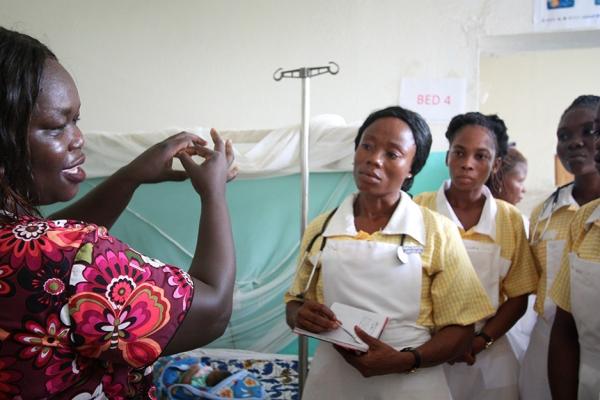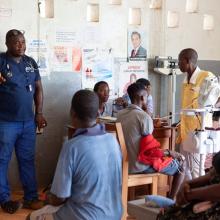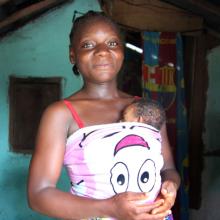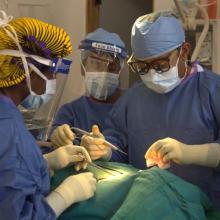When Dr. Tebo Buduo, a young Liberian physician from Monrovia, heard he’d be doing his medical internship in remote southeastern Liberia, he felt some apprehension. Maryland County is some 250 miles from the Liberian capital—a journey that can easily take two days in the rainy season, when dense, orange mud clogs the rural roads.
But when Buduo arrived at J.J. Dossen Hospital, he was pleasantly surprised. Partners In Health, which has been supporting the government-run referral and teaching hospital since 2015 after arriving to respond to the Ebola epidemic, had recently completed a renovation of the site, equipping it with diagnostics and specialist services and giving it a fresh coat of paint.
Buduo, who spent three months interning at the hospital, described his time there as “wonderful.” “I experienced a lot at J.J. Dossen that I would not have experienced in an urban area like Monrovia,” he said. “It surprised me that although it’s in a rural area, there’s nothing that you want in terms of facilities or management of patients that is lacking. It’s really helping to shape our specialty program and to enhance our health care delivery.”
Growing rural medical expertise
J.J. Dossen’s medical education program has been up and running since 2016. Its cornerstone is the residency program in family medicine, which is led by PIH-er Dr. Rebecca Cook, director of medical education and interim director of clinical services. When Cook arrived in Maryland in 2016, there were no specialist doctors assigned to J.J. Dossen; like most of the county hospitals outside of Monrovia, it was staffed by a small number of general practitioners who also juggled leadership and administrative responsibilities.
In partnership with the Ministry of Health, Cook and her team set about improving that.
“We saw early on that training doctors outside of Monrovia would ensure that physicians are getting experience [in rural areas] to hopefully help improve their ability to practice outside of Monrovia, as well as their desire and retention,” she said.
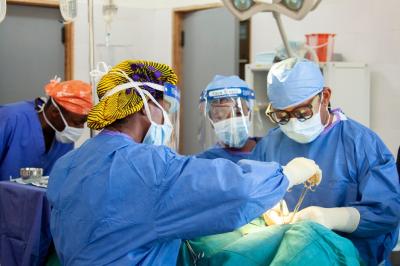
Dr. Korha Billigan, a family medicine resident, assists Dr. Gerald Ekwen, the sole surgeon at PIH-supported J.J. Dossen Hospital in Liberia.
Kyle Daniels / Partners In Health
J.J. Dossen is the only rural rotation site for family medicine training in Liberia. Harper is now in its third year of hosting family medicine residents, with 11 residents expected to rotate at J.J. Dossen this year. The first class is set to graduate in 2020. Meanwhile over the past 12 months, J.J. Dossen has been growing as a training hospital for physicians at various stages, including now hosting intern doctors and general practitioners for their emergency obstetric and surgical care rotations.
Cook said it’s common for residents and interns to experience some apprehension “about being very far from their home and in an unknown place that they see as quite rural. But overall the reports and reviews of the experience have been very positive.” She added that from a learning perspective, “the clinical training they’re getting here is excellent, both in terms of the supervision and teaching by the consultants that are here.”
On-site experts, world-class mentoring
Long-term specialists in pediatrics, internal medicine, surgery, and obstetrics and gynecology are based on-site in Harper serving with PIH, with additional subspecialists visiting, allowing interns and residents to benefit from world-class medical knowledge gained all over the world. At the same time, the physicians-in-training are gaining a broader view of the Liberian health system and of the barriers to accessing health services in the remote southeast.
Because J.J. Dossen is the southeast’s only regional referral hospital, it serves a diverse range of patients, who present with everything from skin complaints, diabetes, and hypertension to complicated cases of malaria, TB, and HIV. And unlike at other county hospitals, there is a greater number of diagnostic tools and therapeutics available, which as Cook says, helps the physicians in training “do more as doctors to take care of patients.”
Empowering nurse leaders
Nurses and midwives are also benefiting from the medical education on hand at the hospital, in partnership with nearby Tubman University, which since 2015 has been the main training site in southeastern Liberia for registered nurses and midwives.
In 2016, J.J. Dossen became the first Liberian hospital to offer a clinical mentorship program for nurses. Every ward now has a clinical mentor and a preceptor—an experienced practitioner who mentors new staff—who both work alongside the government nurses, finding gaps that need to be addressed together.
“In the pediatric ward, the clinical mentor found gaps in administration, and the nurses came back with ideas and projects,” said Viola Karanja, PIH Liberia’s deputy executive director. “In the medical surgical ward, they found gaps in the documentation of vital signs. They also started a project on bed sores, and we found there was a remarkable improvement in the reduction of bed sores.”
Because not every hospital in Liberia is as well-equipped as J.J. Dossen, PIH is teaching both innovation and improvisation.
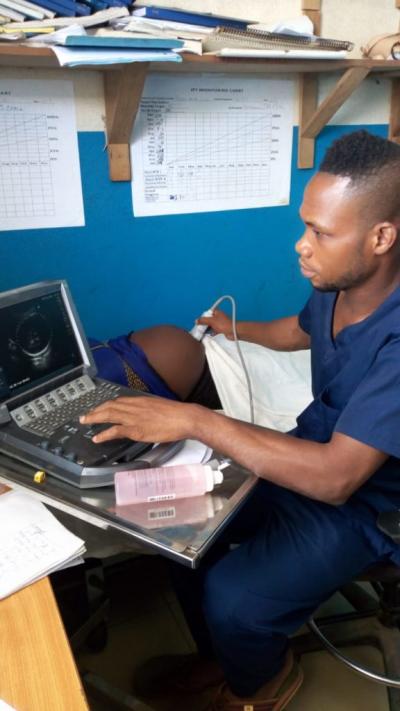
Freeman Yemoda, a Ministry of Health nurse midwife, performs an ultrasound on a pregnant patient at Pleebo Health Center, another facility supported by PIH.
Lewis Kruzer / Partners In Health
“We’re fortunate in the OB/GYN ward to have things like phototherapy for cases of jaundice in newborns,” said Karanja. “But in case our nurses later work at a facility without that, we also show them the natural way: simply putting the baby close to the window, where there’s sunlight.”
When Karanja first began finding innovative solutions to care, bed occupancy was high and staff motivation was low. Both have since been transformed.
“Once we started having clinical mentors in the wards, the nurses could actually see training outcomes,” Karanja added. “They started coming up with new ideas, because they were so motivated.”
There are performance incentives too for those excited to advance their clinical nursing career. Last year two Liberian nurses had the opportunity to spend a month in Rwanda for PIH cross-site training in neonatal care, returning home with innovative new ideas to implement.
Opening doors to state exams
That isn’t the only kind of travel that PIH has been supporting. Historically the Liberia state board exam in nursing has only been held in Monrovia, presenting a tough barrier to overcome for aspiring nurses from the southeast who often lack the funds and resources to travel. And so for the last few years, PIH has been supporting Tubman University nursing students by paying for their travel and lodging while they sit the exam in the capital. Since 2014, 140 nurses have graduated from Tubman University, including 44 graduating with a Bachelor of Science in Nursing.
“It has been a big relief for these students that PIH has been able to organize their transport to Monrovia, because it ensures they don’t miss the exam,” said Daniel Maweu, PIH nurse educator and midwife coordinator.
Last year, for the first time in Liberia’s history, the nursing exam was decentralized and students were able to sit it in Harper, saving the time, costs, and stress of travelling to Monrovia.
Tubman University nurses aren’t the only ones excited by the opportunity to stay in the southeast.
For Buduo, his internship at J.J. Dossen has sparked what may be a lifelong passion for practicing medicine in underserved parts of Liberia. “In the rural areas, you see the gravity of the health care needs of the people,” he said. “That in itself is a push factor for any physician who wants to serve the underprivileged, and not just be an office doctor.”
